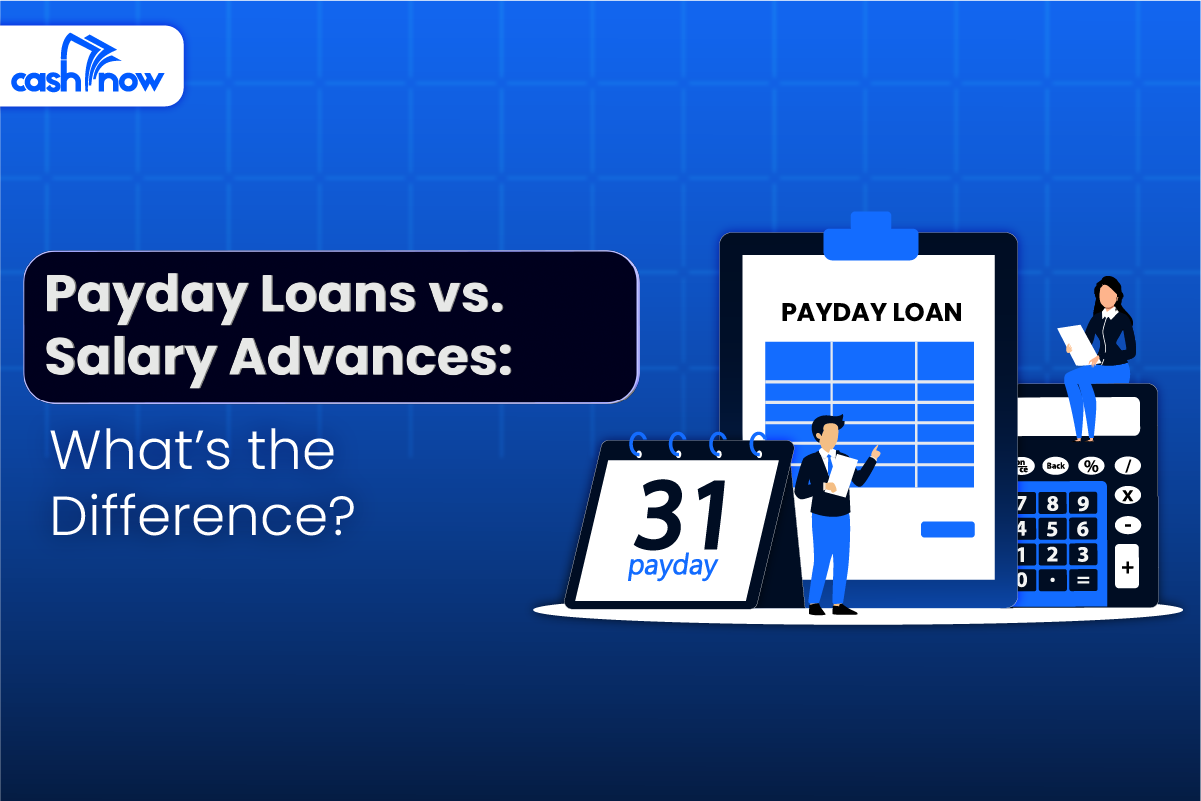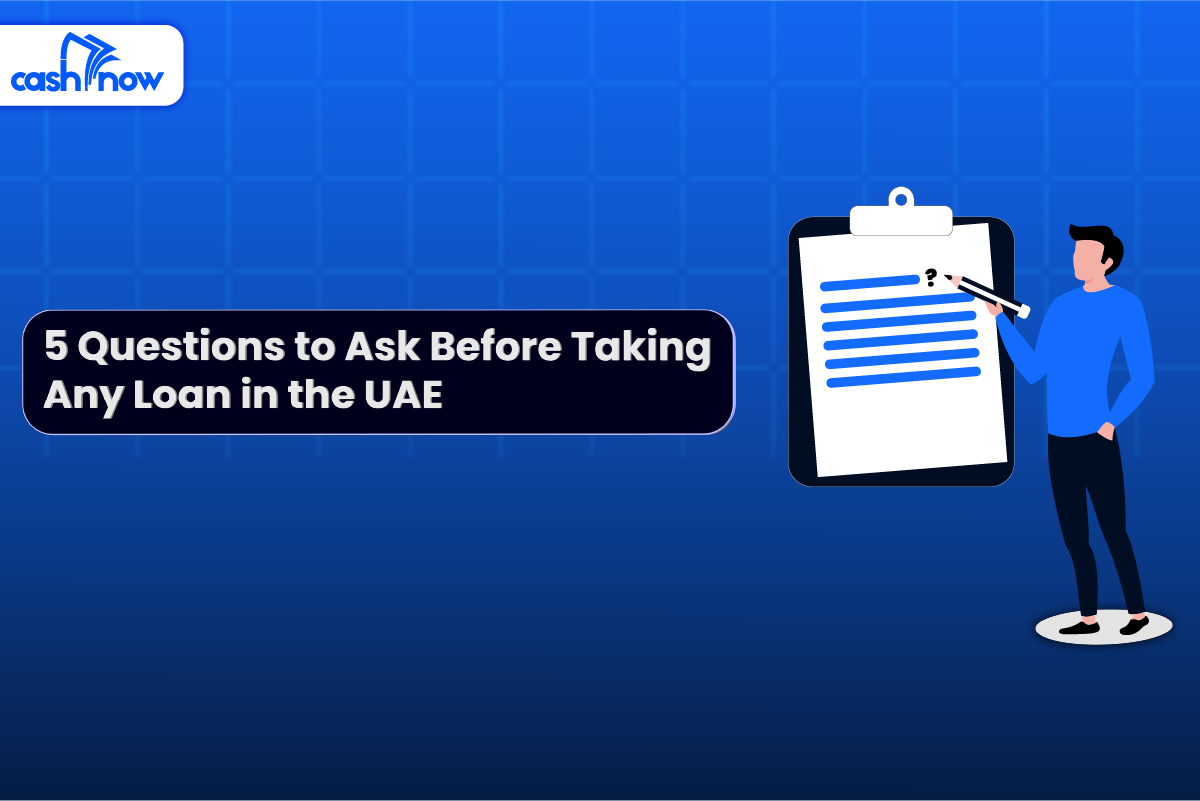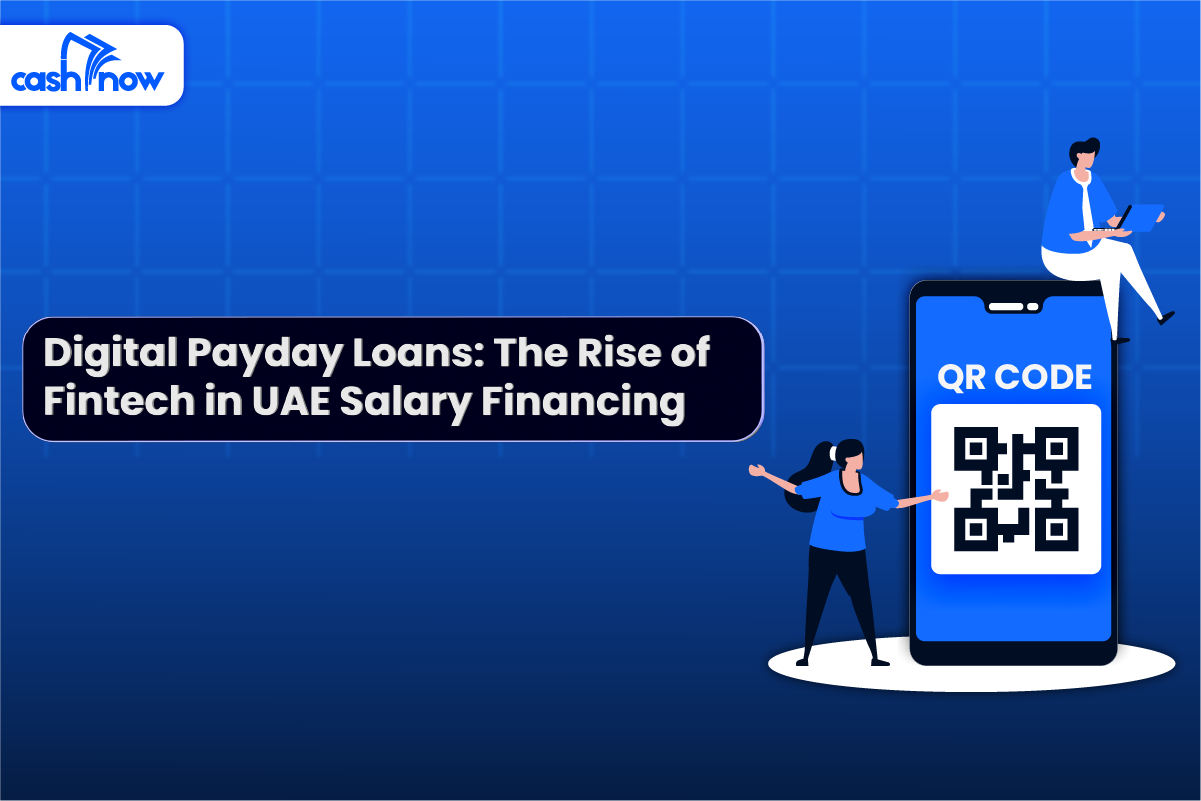Payday Loans vs. Salary Advances: What’s the Difference?

The face of short-term borrowing has evolved with payday loans and salary advances now being more accessible.
When unexpected expenses arise before payday, many people turn to these quick-cash solutions. At first glance, they may seem similar since both of them offer fast access to funds at the moment you need cash assistance.
But while the goal is the same, the way these two options work is quite different. From how you access them to their repayment terms and ideal use cases, each comes with its own fine print. Understanding these differences can help you choose the option that best suits your needs and financial situation.
In this blog, we’ll break down how payday loans and salary advances work.
What is a payday loan?
A payday loan is a short-term loan typically taken by individuals looking to cover immediate expenses until their next paycheck. It’s a type of personal loan that comes with extremely high interest rates. Though they are often marketed as a fast fix for emergencies, they can come at a steep price.
To begin with, these loans are typically offered by third-party lenders or lending apps, not through your employer. They offer quick and easy approvals, usually requiring just proof of income and identification. But the catch lies in the cost.
Payday loans can carry annual percentage rates (APRs) of 300-500% or even higher, along with hidden processing fees or penalties.
Next, the repayment is usually due in a lump sum on your next payday, which can leave borrowers scrambling to repay, or worse, taking out another loan to cover the first. This cycle can repeat itself, making it incredibly difficult to break free from ongoing debt.
For example, if you borrow ₹1,000 through a payday loan, you could end up repaying ₹1,300-₹1,500 in just two weeks. It’s easy to see how this creates a dangerous cycle of debt and financial stress.
What is a salary advance?
A salary advance, on the other hand, gives you early access to a portion of the wages you’ve already earned, without the high costs or risks associated with borrowing. Think of it this way: instead of taking out a new loan, you're simply getting paid sooner for work you’ve already completed.
Traditionally, salary advances are arranged directly through your employer or via partnerships with salary finance platforms and employee benefits programs. To get a traditional salary advance, you’ll typically need to reach out to your HR or payroll team to understand what benefits are available to you.
The cost is typically minimal, as most providers charge no interest or a low, flat fee, and repayment is often designed to be flexible, helping you stay on budget and manage your finances sustainably. Because you’re not borrowing more than you’ve already earned, there’s little risk of falling behind or overspending.
For example, if you need ₹1,000 to cover a mid-month expense, a salary advance allows you to access that amount instantly. When payday arrives, the same amount is deducted, with no spiraling interest or unexpected fees.
However, modern platforms now offer salary-advance-style access through a simple, seamless application process, without needing employer involvement. So, if you’re looking for a short-term financing option that doesn’t require employer coordination, FinTech platforms like Cashnow provide a convenient and affordable solution.
The real difference between payday loans and salary advances
Let’s break down the difference between the two loan types for your better understanding:
Source of funds
Payday loans are offered by third-party lenders or loan apps that operate independently of your employer. These lenders only care if you have a regular income, which is proof that you can repay the loan.
In contrast, salary advances are usually provided by your employer or through their trusted partners. They give you access to money you’ve already earned, not money you’ll owe through a loan.
Repayment method
Payday loans typically require a lump-sum repayment on your next payday. This sudden hit to your paycheck can leave you short again, creating a cycle of dependency.
With salary advances, repayment is usually automated through payroll deduction. The amount is deducted from your next salary in a way that aligns with your income, making it much easier to manage your finances sustainably.
Cost and fees
Payday loans come with sky-high interest rates, often between 300-500% APR or more. On top of that, there may be hidden fees, penalties, or rollover charges that increase your debt overall.
Salary advances, on the other hand, are either free or involve a small fee (flat or a percentage), clearly stated upfront.
Risk level
Payday loans are widely known for their predatory nature. They’re easy to get but hard to escape, as many borrowers end up stuck in a spiral of borrowing and repayment.
Salary advances are far more responsible. Since they’re based on what you’ve already earned, there’s minimal risk of overspending or falling behind.
Who can access them
Anyone with proof of income can usually qualify for a payday loan, but that ease of access comes with high risk.
Salary advances are often limited to salaried employees, but this restriction adds a layer of protection by tying the amount borrowed to your actual earnings.
Why payday loans can be dangerous
Here’s how what seems like a quick fix often comes with serious long-term consequences that can put anyone under financial stress:
Targeting the most vulnerable
These loans are often marketed to people facing urgent financial problems, individuals who may not have the time or mental capacity to carefully evaluate their options, making them easy targets. They’re typically those with limited savings, low credit scores, or few alternatives.
With minimal eligibility requirements, payday lenders make it easy to borrow money, but offer little protection when things go wrong.
A trap of repeated borrowing
Because payday loans are usually due in full on your next payday, they can take a huge chunk out of your salary all at once. If you’re unable to cover your basic expenses afterward, you may feel forced to take out another loan just to stay afloat. This leads to a dangerous cycle of borrowing, where the debt keeps growing and becomes harder to escape.
Lack of regulation and transparency
In many cases, payday lenders operate with little oversight. This means they can hide fees in the fine print, charge sky-high interest rates, and use aggressive tactics to collect repayments. With limited consumer protections, borrowers are left exposed to unethical practices that can push them further into financial instability.
Why salary advances are the safer option
Here’s how payday loans are a far more stable and responsible way to access cash when you need it:
You're not borrowing
Salary advances are based on your already-earned wages, the money you have already earned but want to access before your payday. You’re not taking out a new loan or adding to your debt. You’re simply getting an advance on money that’s rightfully yours. This eliminates the pressure of borrowing beyond your means.
Less stress, no interest traps
Because salary advances usually come with no interest or have a flat, low fee, there’s no risk of spiraling debt. You know exactly how much you’ll repay, and it’s automatically deducted from your next paycheck. That predictability means less financial stress, especially during emergencies.
Safe, transparent, and fair with platforms like Cashnow
Modern salary advance platforms are designed with the user’s safety in mind. You get clear terms, upfront pricing, and compliance with financial regulations, so there are no hidden fees or fine-print surprises. The entire process is fast, secure, and built around trust.
Cashnow is a smarter way to access your earnings
If you’re looking for a safer, faster alternative to payday loans, Cashnow offers instant loans that serve a similar purpose to a salary advance. With on-demand access to funds through a simple mobile app, you can get the money you need without the stress, high interest, or hidden traps associated with traditional payday lending.
Cashnow operates with full transparency, charging a fair interest rate based on the loan amount and tenure. All costs are clearly displayed upfront, with no surprises. You know exactly what you’ll pay, and repayment is automated, making it easy to manage your finances.
What sets Cashnow apart is its commitment to safety and compliance. The platform is backed by local financial regulations and follows best practices to ensure you’re never at risk of unfair treatment. And unlike traditional salary advances that require employer involvement, Cashnow gives you the same benefits without needing to go through HR or payroll departments.
Conclusion
If you’re choosing between a payday loan and a salary advance, don’t focus solely on how quickly the money arrives or the convenience it promises. Consider what it could cost you in the long run.
Look beyond the surface. Interest rates, hidden fees, transparency, and long-term impact on your financial health all matter more than speed alone.
With Cashnow, you get fast access to the money you need in a safe, transparent, and stress-free way.




.webp)
.webp)



